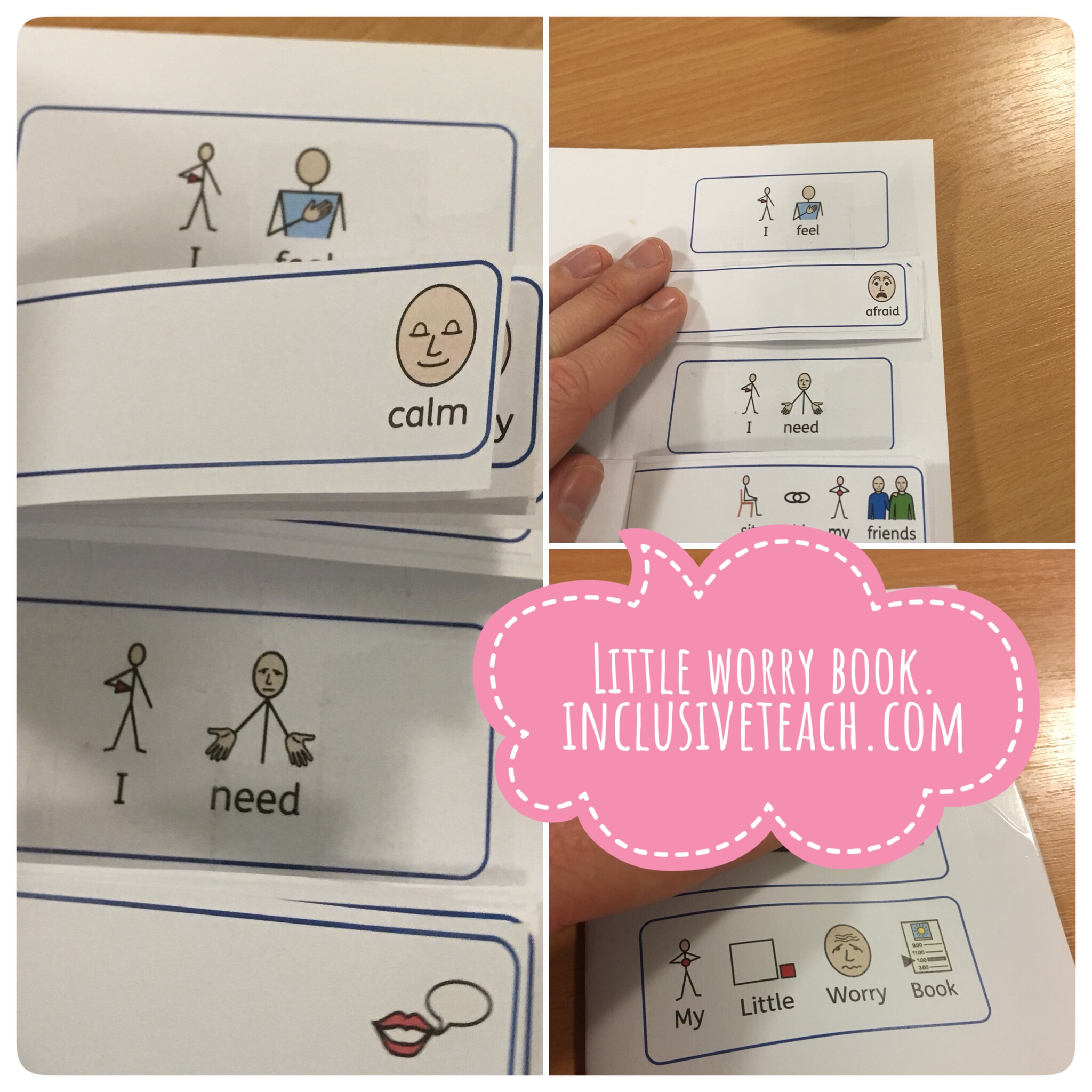Putting SEND On the Political Agenda
The UK SEND Policy Guide
This document captures the discussion between, parents, carers, educators and people with SEND about the state of special education in Britain in 2019 and the messages they want to send to politicians. We asked 6 questions to include in the #SENexchange SEND Political Manifesto. The answers to which we have collated in this document. They are anonymised here but accessible on twitter.
1. What 1 key message do you want Politicians to know about SEND provision in the UK?
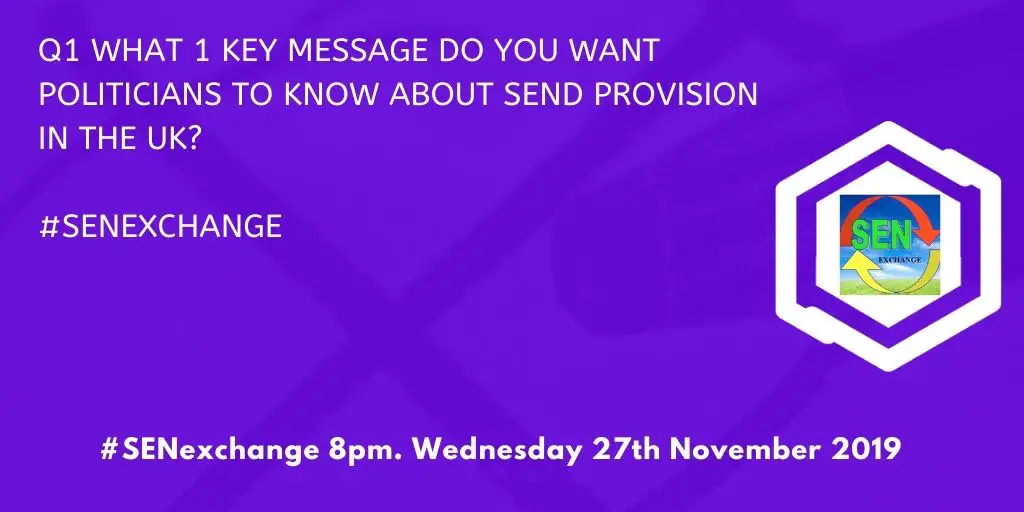
SEND provision in the UK education system is completely inadequate and should be considered a national embarrassment. It is a talking point of political parties but improvement is not happening. So many young people are being failed as they attempt to fulfil their potential. It needs to be properly funded, have less bureaucracy, and most importantly attitudes towards it need to change. CYPs with SEN need to stop being seen as a burden or an add on in education. These kids have so much potential it’s frightening, it just needs unlocking! Education as a whole needs to change and it needs to be better funded. Schools need to stop being results focused and be child focused. Do that and the ‘results’ will take care of themselves.
If we want to be truly inclusive and provide support to children before their progress and well-being deteriorate, we need to seriously invest in services instead of setting arbitrary referral criteria and waiting times which simply cause children to suffer.
There is so much great practice in our sector that could have such a positive impact for all students (inc mainstream)….more collaboration and perhaps a greater value on the work of specialist schools
It can often take years and years for children to access appropriate provision or receive adequate support. The process can be so painful for their families, and so much precious time can be lost
SENexchange Manifesto
SEND definitely needs more funding, but more than that it needs strict accountability of LEAs to stop them from wasting money on things other than provision for SEN children.
Seeing is believing, there’s only so much you can learn from a book, come and visit – Politicians find out about all those who make up your community.
SEND Provision is aHuman Right
To remember that it’s a human right to an education for every child, regardless of difference. That action is required to be committed to, to ensure this is happening, for every child within our country.
A child’s unmet struggle becomes the families struggles and the schools struggles Too often the result is separation from families, inpatient care admissions or suicide
One size does not fit all. There should be a range of inclusive provision to meet learners of all neurodiversities
Plug the gaps. 0-25 should be consistent through the ages. e.g don’t stop SEN transport just because child is older. PfA should start early & commissioners plan for adult services early too
It’s not working. There are children up and down the country ending up in hospital or Tier 4 units because their needs are being ignored. And then they end up under CAMHS who continue to ignore them.
The SEND Code of Practice
The SEND code of practice (COP) is impossible to put into practice in reality. The expectations on schools are unreasonable and this is causing stress for parents. It has actually given rise to an us and them culture rather than solving the problem. We need more training and funding.
The current education system does not work for neurodiverse children
SENexchange Manifesto
There needs to be qualitative look at SEND needs at borough and county level, not just quantitative. It’s laudable that the aspiration is to meet needs in Mainstream schooling but this is not always achievable or the correct environment for some
SEND & Inclusion Local Authority Funding
The Local authority needs to have a lot more funding to be able to ensure every child has access to a suitable placement to facilitate their education. Too many kids have no placement & are missing out on their right to an education
That every child has their own goal to achieve and that to achieve those goals many of those children are supported by TAs with years of experience, on very low wages.
All teachers to have training about children with SEN to a high standard.
Fund inclusivity because our children are worth it.
More awareness and training for staff to truly understand our children would be a great start. Then there is more provision and resources as well as spending up things and not dragging heals. Make local authorities more accountable for their failures on Sen.
That every child is different and there is no model fit! Funding is key
That it is always, without exception, without any preamble or before the paperwork touches their desk; a Fight. And it shouldn’t be, it really shouldn’t. Collaboration and engagement – not dispute and entrenched positions; that is how it should be. Must be for good outcomes.
Lack of adequate funding means schools are failing pupils with additional needs. That families have to wait too long to access support.
There is complete inconsistency in provision across the UK. As a parent of a child with SEN (special education needs) I believe that funding and budget come beck the needs of the child. That perception needs to change and the education authorities needs to work hard to do that.
Enable schools to work with parents by having an effective and supportive LA that is well resourced and timely. Pitting parents against schools is devastating and destructive for children, families and schools. Schools that are inclusive should be commended by OFSTED
That children have rights too! Restraint and seclusion are forms of abuse. They can cause long term mental health conditions. Remember that Behaviour is Communication! Connection not control!
Honesty and Transparency in the SEND System
Transparent conversations re: funding. Work collaboratively. LA’s shouldn’t be gatekeepers-instead facilitators, reduce bureaucracy = more time spent supporting kids, all try to understand each other’s perspective-determine best pathway. Equitable decisions to meet needs of all.
Take time to listen to the young people
Honesty and transparency and a quick turn around in services with action being taken where it is needed, every SEND child/YP is different and their needs can often be masked in schools, schools and services need to be available 365 days a year as changes to routines in holidays can have a huge negative impact.
Schools ‘failing to diagnose at least 80% of dyslexic pupils’. Parents need to be given some control over the extra funding provided to children who require extra support (including those with pupil premium).
It needn’t be so hard to ensure every child has what they need to make their own progress
2. How can we amplify the voice of young people with SEND in politics?
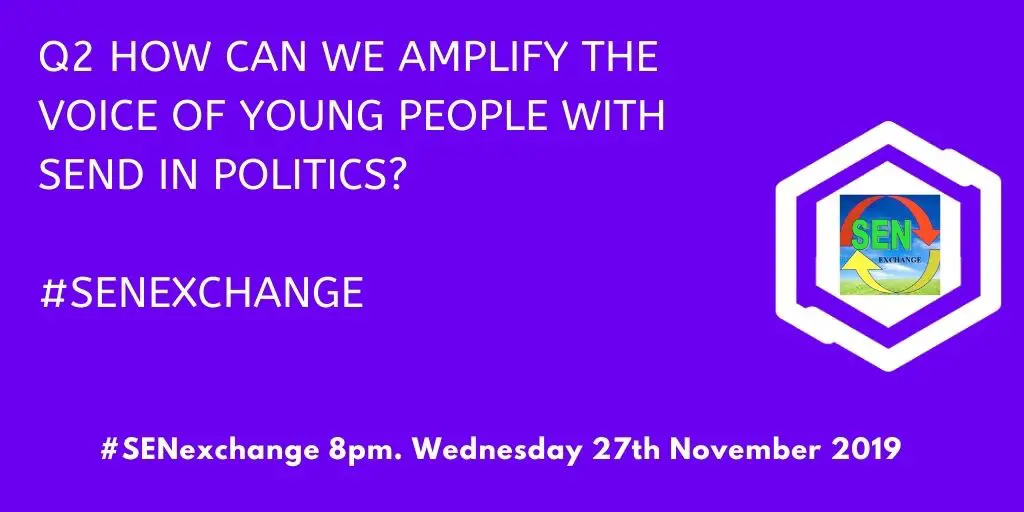
There absolutely needs to be a seat at the table for people with additional needs
We need to bombard our MPs and local community with invites to see our pupils and staff in action. Learning isn’t just GCSEs and qualifications and the best way to present that is through real life experience.
Supporting our MP’s and the wider society to understand the great progress our students make and the positive impact and value they can add to their community is something we all should be working towards. Please engage MPs!
Constantly celebrating the positives and emphasising the barriers they are having to overcome!
SENexchange manifesto
Engage our local MPs with our schools and the amazing things that are happening. The perfect time to start this is the first few days our next set of MPs are voted in, before they get too busy! Invite them to your school, ask them to show you round Parliament!
Set up local or regional SEN steering groups. Visit parliament to put our views across. Allow school councils in SEN schools to take their matters to local MPs.
In some cases, we need to be their voice. We need to be campaigning, raising awareness and increasing visibility of them.
I think MPs (members of parliament) should go into schools and speak to staff, pupils and parents to truly understand what is happening. MPs to truly make a change need to be more involved and closer to the really issues and not just sitting in their office.
Produce easy read & braille manifesto. Tailor hustings to younger audience and ensure support is there e.g BSL signer, LD advocacy.
Accessible political manifestos would enhance engagement in politics for those with SEND.
SENexchange
There is so much great practice in our sector that could have such a positive impact for all students (inc mainstream)….more collaboration and perhaps a greater value on the work of specialist schools
I’m collating resources to help voters with SEND participate in the upcoming general election here: https://twitter.com/pancake_puns/status/1189518745892458496?s=21. Will add Easy Read party manifestos as they’re released, at the moment it’s only the Greens who’ve published one. #SENExchange
3. What needs to change in social care and support for families?
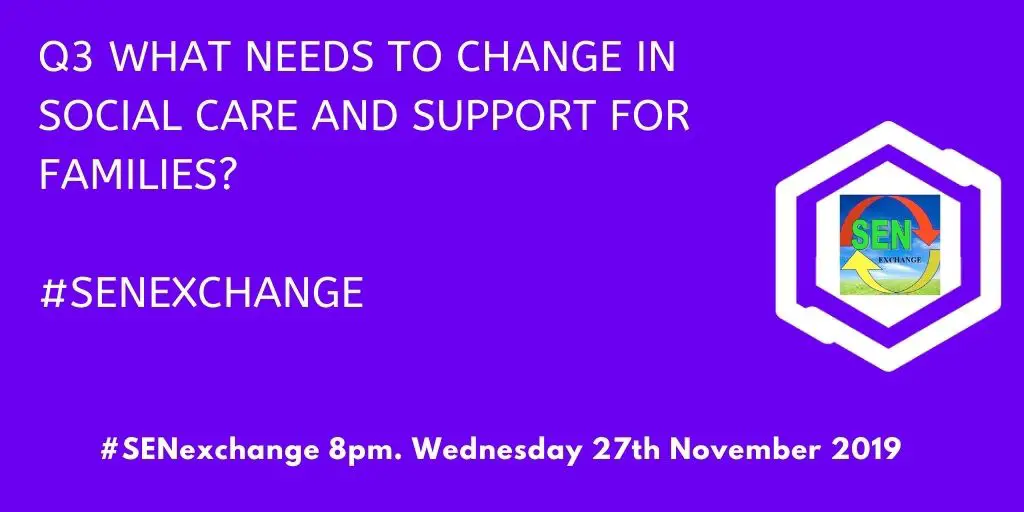
But more specialist social workers who can really make a difference to families. It doesn’t instil confidence if, as a parent you have to train the social worker in the basics around differences in communication/sensory needs etc.
More money and resources!! Some services are shocking, but it’s not necessarily the fault of the individuals within the system. Social care *can* be a generic service too with very little knowledge of SEND and our pupils, so shared working/CPD would be good
More resources, more training, more money, more specialist schools, more therapy input in schools
Social workers are overworked and underpaid, let there be a job swap between MPs and Social workers. C4 could do it as a documentary! More hands on experience for everyone involved. EHCP reviews often involve professionals who don’t always know the young person.
Social services hubs within schools would really help with team working. OR additional funding to allow meetings to be held at a place of the family’s choosing to address power imbalance
Bring in some new and robust training for Social care workers so that they have more empathy towards the families they are supporting. The importance of their role is often misunderstood.
Separate disability from child protection
Take away the deficit model social workers apply when assessing for Short Breaks (don’t need to see bedroom!) Commissioners to really try to listen to what YP wants. More variety in SB’s let’s not limit choice to soft play & drumming.
Specialized support service, parent groups, support groups, general community help. Outreach specialized staff and medical profession taking complaints seriously first time.
SENexchange Manifesto
If we want to be truly inclusive and provide support to children before their progress and well-being deteriorate, we need to seriously invest in services instead of setting arbitrary referral criteria and long waiting times which simply cause children to suffer.
More specialist social workers who can really make a difference to families. It doesn’t instil confidence if, as a parent you have to train the social worker in the basics around differences in communication/sensory needs etc
Q4 What needs to change in education for young people with SEND?
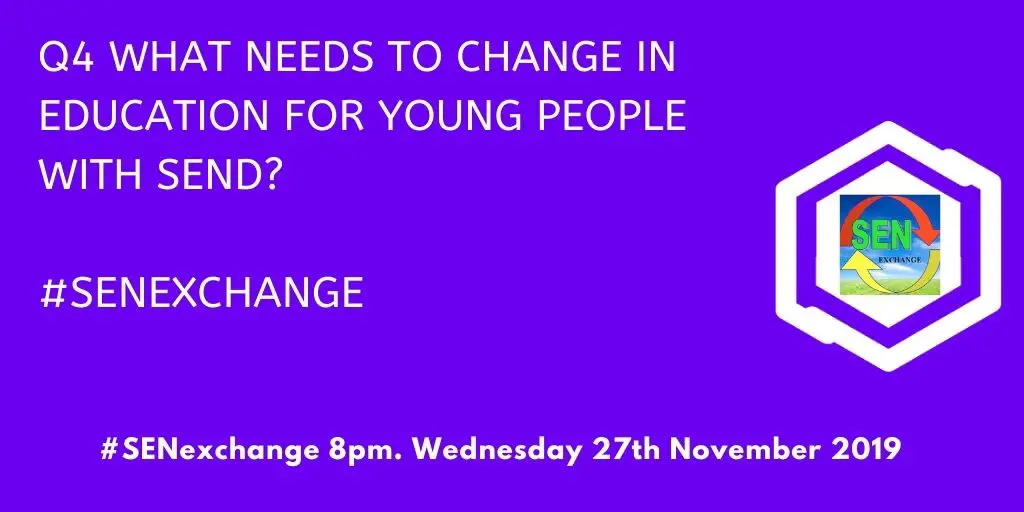
The support that they get. Funding needs to be provided so that they get support that is relevant and tailored to their needs
Funding, staff training, class structure, curriculum direction, any sort of acknowledgement from those in power, more opportunity, job opportunities…
The culture first & foremost, but those in positions of power who are able to influence change in education must partner with parents & from the start. Change the process – change the outcome #SENexchange
Ensure there are high aspirations for all students, and we work on the things that lead to positive outcomes for them rather than jumping through hoops.
Environment is key! We need to be more flexible, adaptable and creative with how we teach and support these children rather than trying to make them fit into our educational system
Have a national template for all important docs. Training of SEND mandatory for all teaching staff (inc refresher training). Mandatory training for SEN caseworkers would help too. Have a neutral body to decide provision/funding as LA has conflict of interest.
I think our approach needs to be holistic, and I worry that subject-specific deep dives could prevent that from happening.
Autism training needs to be robust and look at all sorts of presentations (not just Kanner model). Training with teachers, case workers and families alongside
SENexchange
9 Suggestions to Improve the SEND Provision in UK Schools
1. Money
2. People to do the work
3. Assessment systems that everyone understands
4. Training through continuous CPD and support from advisory teachers
5. Legal protections for those on SEN support
6. Study into different models of specialist provision and agreement at nat level
7. Training for SEN officers that includes visiting children in schools
8. Open discussions with families over what support looks like in school (see numbers one and two)
9. Provision of multidisciplinary resource in mainstream schools
Children at the Centre of the Education System
Children need to be placed at the centre of everything the education system does.
The people in local authorities who routinely decide that children do not require statutory assessment or provision…should visit schools to see the level of need & the extreme stress experienced by staff & parents. They may become more understanding & compassionate.
Sometimes clarity around the child’s views can help a great deal in demonstrating that thresholds have been met for statutory assessment.
Attitudes, ethos, children as humans not data, increase kindness, honesty, transparency, integrity. Adhere to the equality act, increase leaders with a moral compass.
Equity amongst the SEN cohort. EHCPs create equality. They enhance the support of a few, making this desirable for the majority. The amount of support available will always be finite, the amount of money in EHCPs is astronomical for not much gain in terms of provision.
Training, training and training. Understanding the needs a champion support.
Needs/ interests led curriculum/provision and environment, standardised paperwork for EHCA/EHCP. Moderation of provisions and quality of documentation across LAs and between them and proper funding for proper support and interventions
Inclusion, looked as human and part of a bigger system. Funding, not ignoring doing assessments, addressing issues early, highly trained staff even if they don’t have QTS being enabled to work them (years Vs a week of SEND), presence and acceptance in community etc
The removal of restraint and seclusion rooms!
SENexchange
Access to specialist assessment earlier on so needs are clearly identified
The children need to be more important than attendance figures. Mental health problems need to count as illness (as per D of E instruction). Teachers need training on ASD particularly so that they can recognise when behaviour comes from needs not being met.
5. What needs to change in health for those with SEND?

The opportunity to be available for shared working – it just doesn’t happen
Parents should be taken more seriously; they know their children and know when their children are trying to communicate in ways that health professionals may not have a deep enough knowledge of that person to understand.
Properly funded, vital services such as SALT & OT would be a great start!
SENExchange Manifesto
Similar to education, we need more funding, more training, more resources so that we can cut down the waiting lists and offer more services and more specialist services with professionals who have time to get to know the child!
To be listened to. It’s not that difficult. Just tonight a dear friend’s son was served this in hospital. He doesn’t even struggle with feeding or swallowing. All they had to do was ask.

Autism diagnosis to include PDA. Follow up post diagnosis to see if other issues such as sensory processing. Understanding autistic people can have Mental Health problems like anyone else BUT recognise autism is not a MH condition.
More communication between services. Too many children fall through the net as one service decides to discharge, thinking that another service is taking over when this isn’t the case. Very frustrating for parents and schools as so much time is lost
Implement all of the recommendations from the all of reports that the Govt have ever ordered to placate us
#Oliverscampaign let’s start with EQUALITY, followed by ACCESSIBILITY, REASONABLE AJUSTMENTS, QUALITY PATIENT CENTRED CARE
6. How can we continue to improve community access for all?

Mandatory free training for all community services including shops, restaurants, hairdressers, etc. to ensure SEND children can access their services
Funded SEND training for all community organisations
Be creative! Garden centres, for example, are home to a whole host of wonderful sensory experiences!
Keep using what resources are available, and keep asking for more. The more visible our young people are, the more people will see the value of them being members of our communities.
#SENExchange Manifesto
We need to drop the focus on punitive behavioural approaches and neuro-myths and spread the word about the real keys to academic, social and emotional success. Attachment. Nurture. Relationships. Seeing behaviour as communication. Working at the child’s age & stage
Perhaps work more around true inclusion at all times rather than pushing for autism hours. Relaxed performances are one thing (& great) but I want autistic people to feel welcomed & comfortable in shopping centres all the time. Who needs piped music in the loo?
#SENexchange Look at the cultural inclusion manifesto
A manifesto to ensure cultural inclusion for all
AND Advocate Paul Morrow introduces the Cultural Inclusion Manifesto – a guiding set of principles to help achieve real inclusion anewdirection.org.uk
Universal design, acknowledging social model of disability, inclusion and acceptance and visibility.
SEND training for all staff in education and for all training providers. Awareness may lead to more effective interventions as a result of greater understanding!
Knowledge about accessible places.
A message to UK Political Parties about the SEND Education
Thank you for taking the time to read the SEND manifesto! We are all working to develop society for the benefit of all. All should have a seat at the table and their value celebrated. If you take the time to acknowledge this it would be greatly appreciated by many of those you seek to represent in this and future elections.
SENexchange
#SENexchange #Flipthenarrative


